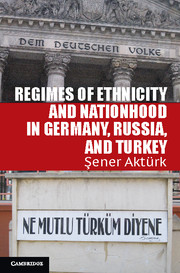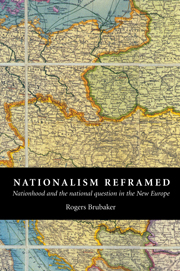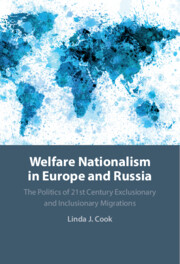Regimes of Ethnicity and Nationhood in Germany, Russia, and Turkey
This is a book about what it meant to be German, Soviet, Russian, and Turkish in the twentieth century, and how that definition radically changed at the turn of the twenty-first century. Germany's ethnic citizenship law, the Soviet Union's inscription of ethnic origins in personal identification documents, and Turkey's prohibition on the public use of minority languages, all put in place in the early twentieth century, underpinned the definition of nationhood in these countries. Despite many challenges from political and societal actors, these policies did not change for many decades, until around the turn of the twenty-first century, when Russia removed ethnicity from the internal passport, Germany changed its citizenship law, and Turkish public television began to broadcast in minority languages. How did such tremendous changes occur? Using a new typology of “regimes of ethnicity” and a close study of primary documents and numerous interviews, Sener Akturk argues that the coincidence of three key factors – counterelites, new discourses, and hegemonic majorities – explains successful change in state policies toward ethnicity.
- Discusses the removal of ethnicity from Russian identification cards and the role of Jews, Germans, Tatars, Bashkirs and other ethnic groups in this change
- Systematically documents Kurdish and Alevi voting behavior in Turkey from the 1950s to the present day
- Incorporates interviews with both immigrant-origin and ethnic German members of the German parliaments from all the major political parties and their attitudes toward ethnic diversity and change of the citizenship law in Germany
Awards
Winner of the 2013 Joseph Rothschild Prize in Nationalism and Ethnic Studies, Association for the Study of Nationalities
Reviews & endorsements
"… a must-read for students of ethnicity and nationalism. [This book] is conceptually innovative, empirically rich, and theoretically inspiring. It is particularly timely for the case of Turkey where issues on ethnicity and nationhood are now at the centre of public debates."
Ahmet T. Kuru, Insight Turkey
"Regimes of Ethnicity [and Nationhood in Germany, Russia, and Turkey] provides an important and exciting contribution to the existing literature on ethnicity, minorities, and nationalism … For scholars of nationalism and ethnicity, the book offers a robust theoretical framework for classifying regimes of ethnicity and explaining their persistence and change … This book not only addresses an issue area that has not been studied by historical institutionalists but also offers a theory of endogenous institutional change which constitutes an under theorized aspect of historical institutionalism."
Yoav H. Duman, Comparative Political Studies
"This ambitious work in comparative politics promises a lot and delivers a lot … An impressive feature … is the richly documented, parsimonious account of each of the three countries. The author skilfully parses German, Turkish, and Russian primary sources. The footnotes themselves constitute a wealth of information … Aktürk's general achievement is to have provoked political science specialists on nationalism and ethnicity with iconoclastic interpretations of recent developments in three major countries. In Turkey and Russia more than in Germany after its landmark citizenship law, state policies on the status and rights of minorities continue to be negotiated in many important ways. His voice seeking to make sense of these ongoing processes is one we need to listen to critically."
Raymond Taras, Perspectives on Politics
"Aktürk's most significant contribution to studies of recent changes in German citizenship laws is probably his focus on the role played by immigrants, especially Turkish immigrants, in bringing about those changes … One must recognize Aktürk's extraordinary skills, not least linguistic, and the care he has taken, through extensive interviews and research in primary and secondary sources, to cast light on a central question of the modern age."
Eli Nathans, American Historical Review
"Empirically, Aktürk's book is impressive. He does well at combining historical narratives from three different area-studies traditions and drawing comparisons between countries endowed with different constitutional arrangements."
Survival: Global Politics and Strategy
"Based on the data gathered from archival materials, interviews, newspapers, and electoral statistics, Aktürk provides a theoretically original, empirically deep, and methodologically strong argument on persistence and change in the regimes of ethnicity … One of the innovative approaches in [this book] is the intuitive blend of historical institutionalism - mostly associated with the studies of welfare regimes - and the studies of ethnicity and nationalism. Through this insightful combination, Aktürk also shows the endogenous dynamics of institutional change without any presence of exogenous shock that many new institutionalists refer to."
Serhun Al, National Identities
"… provides an in-depth explanation of ethnicity policy reform in Germany, Russia and Turkey … empirically well grounded and makes novel and useful contributions to the field that should guide future scholarship."
Alexander Caviedes, German Politics
"… a well-conceived and well-tested study … recommended to scholars interested in citizenship studies [and] institutionalists as well as to sociologists as a fine read."
Nur Bilge Criss, Turkish Studies
Product details
November 2012Paperback
9781107614253
321 pages
235 × 155 × 15 mm
0.47kg
11 b/w illus. 5 maps 36 tables
Available
Table of Contents
- Part I. Theoretical Framework and Empirical Overview:
- 1. Regimes of ethnicity: comparative analysis of Germany, Soviet Union, post-Soviet Russia, and Turkey
- Part II. Germany:
- 2. The challenges to the monoethnic regime in Germany, 1955–1982
- 3. The construction of an assimilationist discourse and political hegemony: transition from a monoethnic to an antiethnic regime in Germany, 1982–2000
- Part III. Turkey:
- 4. Challenges to the ethnicity regime in Turkey: Alevi and Kurdish demands for recognition, 1923–1980
- 5. From social democracy to Islamic multiculturalism: failed and successful attempts to reform the ethnicity regime in Turkey, 1980–2009
- Part IV. Soviet Union and the Russian Federation:
- 6. The nation that wasn't there?: Sovetskii narod discourse, nation-building, and passport ethnicity, 1953–1983
- 7. Ethnic diversity and state-building in post-Soviet Russia: removal of ethnicity from the internal passport and its aftermath, 1992–2008
- Part V. Conclusion:
- 8. Dynamics of persistence and change in ethnicity regimes.








